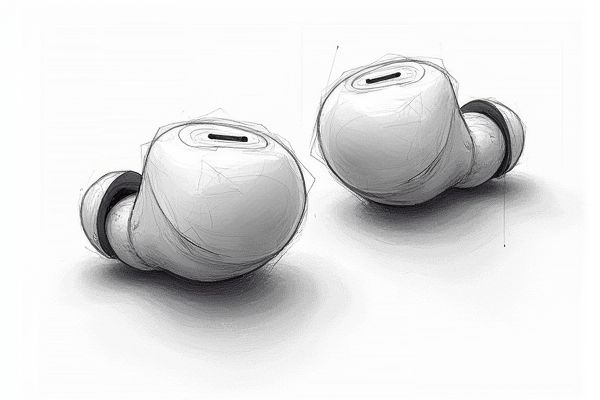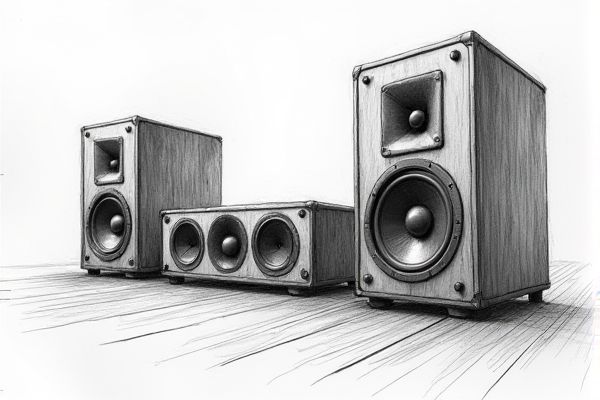The world of True Wireless Stereo (TWS) earbuds has exploded in popularity, offering a wide array of options for audio enthusiasts and casual listeners alike. With advancements in technology, the market presents a myriad of brands that stand out for their superior sound quality, comfort, and battery life. Whether you're looking for cutting-edge features or value for money, there's something for everyone. Curious to explore which brands top our list for the best TWS earbuds? Discover our top picks below.

Illustration of tws
Best brands of tws in 2025
Apple
Apple remains the undisputed leader in the true wireless earbuds (TWS) market, holding a significant 22% market share in Q2 2024, nearly tripling Samsung's share of 7.8% and outpacing Xiaomi's 6.5%. AirPods have sold 75 million units in 2023 alone, contributing to a $10 billion annual business for Apple. The brand's dominance is further highlighted by its 72.6% market share in the global smart personal audio market, with a 12.6% annual growth rate. Apple's AirPods have become a mainstream accessory, with sales figures indicating they make up 60% of the global wireless headphone market. The upcoming AirPods 4, announced in September 2024, feature the H2 chip, Bluetooth 5.3, and a USB-C charging case, further solidifying Apple's position.
Sony
Sony is a prominent player in the True Wireless Stereo (TWS) market, known for its high-quality products such as the WF-1000XM4 earbuds, which feature active noise cancellation. In Q2 2024, Sony maintained a significant presence with 4 million shipments, contributing to a 3.7% market share in the smart personal audio market. The company has seen notable gains in both flagship and entry-level products, with a 17% increase in market share in Q1 2024. Sony's strategic pricing, including models under $50, has helped navigate market challenges. The company's innovations and strong product portfolio continue to drive its competitiveness in the TWS segment.
Samsung
Samsung has emerged as a significant player in the True Wireless Stereo (TWS) market, particularly with its Galaxy Buds series. In 2021, Samsung increased its TWS market share from 6.7% to 7.2%, driven by the success of the Galaxy Buds Pro and Galaxy Buds 2, which saw a 33% increase in sales. The Galaxy Buds Pro, launched in the first half of 2021, contributed substantially to this growth, especially in the over-$100 TWS segment where Samsung held a 17% market share, second only to Apple's 57%. Samsung's aggressive marketing and the quality of its earbuds have helped narrow the gap with Xiaomi, positioning Samsung for potential further growth. The Galaxy Buds 2 Pro, with its improved noise canceling and high-resolution wireless audio streaming, continues to be a top choice for Samsung device users. For more insights into Samsung's success with the Galaxy Buds Pro and Galaxy Buds 2, visit the SamMobile article.
Bose
Bose, although often debated among audiophiles, remains a significant player in the true wireless stereo (TWS) earbuds market, known for its innovative engineering and market presence. In the global TWS earbuds market, which is projected to reach USD 563.2 billion by 2030 with a CAGR of 34.9%, Bose competes alongside major brands like Apple, Samsung, and Sony. Despite criticisms, Bose's products, such as their TWS earbuds, are recognized for their acoustic quality and advanced features. The company's engineering prowess, including its use of anechoic chambers, ensures high-quality sound and reliability. In the competitive TWS market, Bose continues to innovate, as seen in their integration of healthcare functionalities and other advanced features. For more information on their offerings, you can explore their Bose SoundLink Free.
Sennheiser
Sennheiser, a renowned brand in the audio industry, is a key player in the True Wireless Stereo (TWS) market, known for its high-quality and innovative products. The company's TWS earbuds are popular for their superior sound quality, noise cancellation, and ergonomic designs. Sennheiser's market presence is significant, with the TWS market expected to grow at a CAGR of 14.06% from 2024 to 2029, reaching a market size of USD 77.47 billion by 2029. Sennheiser's products cater to a wide range of consumers, from audiophiles to fitness enthusiasts, and are available in various regions, including North America, Europe, and the rapidly growing Asia Pacific market. The brand's commitment to technological advancements and consumer preferences has solidified its position as one of the best producers of TWS earbuds.
Jabra
Jabra is a leading brand in the true wireless stereo (TWS) earbuds market, known for its high-quality audio and video solutions. The company is part of the top-tier equipment providers, with its technology enabling seamless connectivity, especially in corporate and professional settings. Jabra's products, such as the Evolve2 headsets, are praised for their ease of use and clear audio, making them a favorite among businesses and individuals alike. In the TWS market, Jabra competes alongside other major players like Apple, Sony, and Bose, contributing to the market's significant growth, with North America holding a large market share of over 35% in 2021. For more information, visit Jabra's official website.
Anker
Anker's Soundcore brand has established itself as a significant player in the true wireless stereo (TWS) market, known for its high-quality and affordable products. The Soundcore Life P3 earbuds, for example, offer impressive features such as 35 hours of total battery life, active noise-canceling, and Bluetooth 5.0, all at a competitive price point of around $80. Despite the dominance of brands like Apple, which holds around 17% of the TWS market share as of Q3 2024, Anker's strategic pricing and feature-rich products have helped the brand gain traction. In Q2 2024, the TWS market saw a 12.6% annual growth, with a significant portion of sales coming from the sub-US$50 price segment, a strategy that Anker has successfully leveraged. The brand's commitment to quality and value has made it a favorite among consumers looking for reliable and feature-packed TWS earbuds.
JBL
JBL, owned by Harman International, a subsidiary of Samsung Electronics, is a prominent player in the true wireless stereo (TWS) market, although it does not lead in market share. In the TWS segment, Apple and Samsung dominate, with Apple holding around 22% market share in Q2 2024, while Samsung has about 7.8%. JBL, however, is well-known for its high-quality audio products, including home and professional audio equipment, and has strategically contributed to enhancing the market presence of its parent companies. Despite not being a market leader in TWS, JBL's expertise in audio technology is highly regarded, particularly in the studio and home audio sectors. The brand continues to innovate, such as adding novel features like displays in earphone cases to enhance user interaction.
Google's Pixel Buds, particularly the Pixel Buds Pro 2, have established the brand as a significant player in the True Wireless Stereo (TWS) market. Equipped with advanced features like Active Noise Cancellation, a custom Tensor A1 chip for enhanced audio and AI capabilities, and a comfort-fit design based on 45 million data points from ear scans, these earbuds offer superior performance. The Pixel Buds Pro 2 support up to 8 hours of backup with ANC and an additional 30 hours from the case, and they include innovative features such as Clear Calling and Conversation Detection. Despite Apple and Samsung dominating the market, Google's Pixel series has seen notable growth, with Google's US market share increasing significantly in recent years, such as a reported 4.6% market share in 2023. For more information about the Google Pixel Buds Pro 2, visit the article.
Beats by Dre
Beats by Dre, acquired by Apple in July 2014, has emerged as a significant player in the true wireless stereo (TWS) market, driven by the immense popularity of its Studio Buds and Fit Pro models. In Q1 2022, Beats saw an impressive 553% year-over-year growth, reaching 2.4 million units shipped, contributing substantially to Apple's overall TWS shipments which increased by 14% to 21.7 million units. This growth highlights Beats' ability to target a diverse user base, including both iPhone and Android users. The brand's success is attributed to its unique styles and niches, differentiating it from Apple's core AirPods line. Beats' strong performance underscores the effectiveness of Apple's dual-brand strategy in the TWS market.
















Leave a Reply
Your email address will not be published.